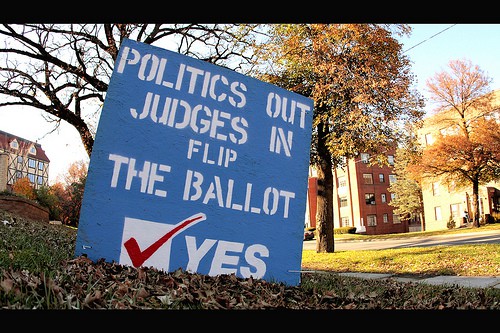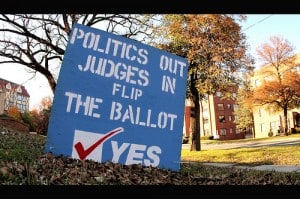Only two months into its 2013-14 Term, the Supreme Court is already making waves. Though, this time it isn’t because of anything it has done, but rather, what it hasn’t done. On November 18, the Court turned aside a plea by death row inmate Mario Woodward to review his case and possibly save his life. Now, this isn’t too unusual. The Court turns aside most of the cases that come before it, including death penalty cases. What was unusual, however, was that Justice Sonia Sotomayor, joined in part by Justice Stephen Breyer, publicly criticized the Court for not taking the case.
Her opinion, formally a “dissent from denial of certiorari,” didn’t directly say that Mr. Woodward ought to be spared from execution. Nor did it say that he was innocent of the charges. Rather, Justice Sotomayor was critical of the Court for ducking a critically important issue — who decides to inflict the death penalty?
In this case, an Alabama jury voted 8-4 to spare Mr. Woodward’s life. If their verdict was followed, he would be sentenced to life in prison without the possibility of parole. However, Alabama law says a jury’s decision on this issue is merely “advisory.” Disregarding the jury’s advice, the trial court judge sentenced Mr. Woodward to death.
The problem, of course, is that our system encourages the use of juries to be the conscience of the community. Andrew Cohen in The Atlantic has an excellent piece on just how dangerous this “override” system can be. Pulling no punches, Cohen calls out the Court for hypocrisy. In numerous other cases, the Court, including such staunch conservatives as Antonin Scalia and Clarence Thomas, has called for a greater and greater respect for the role of the jury. Yet here, silence. (Scott Greenfield at the blog “Simple Justice” is even more critical of Justice Scalia.)
The deep problem and fear is a politicization of the criminal justice system, especially of death penalty cases. Justice Sotomayor takes the point square on in her opinion:
What could explain Alabama judges’ distinctive proclivity for imposing death sentences in cases where a jury has already rejected that penalty? There is no evidence that criminal activity is more heinous in Alabama than in other States, or that Alabama juries are particularly lenient in weighing aggravating and mitigating circumstances. The only answer that is supported by empirical evidence is one that, in my view, casts a cloud of illegitimacy over the criminal justice system: Alabama judges, who are elected in partisan proceedings, appear to have succumbed to electoral pressures … One Alabama judge, who has overridden jury verdicts to impose the death penalty on six occasions, campaigned by running several advertisements voicing his support for capital punishment. One of these ads boasted that he had “`presided over more than 9,000 cases, including some of the most heinous murder trials in our history,'” and expressly named some of the defendants whom he had sentenced to death, in at least one case over a jury’s contrary judgment … Alabama judges, it seems, have “bent to political pressures when pronouncing sentence in highly publicized capital cases.”
Regardless of your position on the death penalty, the system has to be better than this. We need to do our best to avoid the injection of partisan political concerns. And we need a judiciary that is willing to engage the issues fairly, with transparency, with integrity, and with courage to do the right thing.
******
Politics Out. Judges In. Courtesy Flickr user Phil Roeder.



